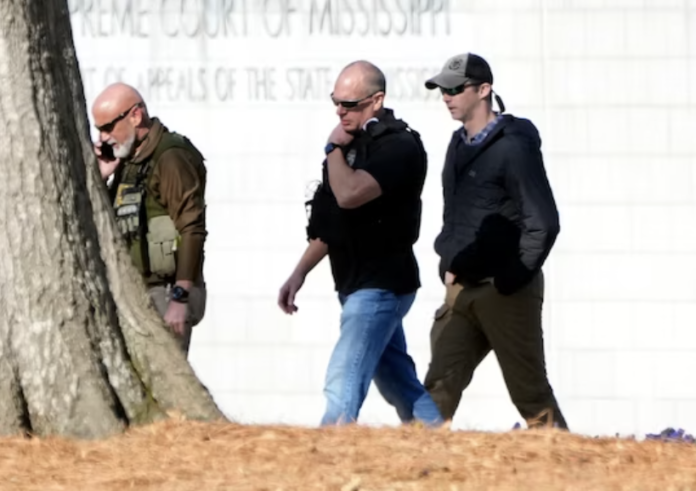Расті Бауерс, колишній спікер Палати представників Арізони, який відіграв ключову роль у протистоянні спробам скасувати президентські вибори 2020 року, приїхав у свій район на схід від Фінікса наступного дня після Різдва, щоб побачити жахливу сцену.
Його дім, розташований на ґрунтовій дорозі в некорпорованій частині пустелі, оточували помічники шерифа. Невідомий повідомив, що всередині знаходиться саморобна бомба та вбито жінку.
Інцидент із ударом, жартівливий дзвінок екстреним службам, спрямований на реакцію правоохоронних органів, став не просто жахливим моментом для Бауерза та його родини. Це була одна з багатьох насильницьких погроз і актів залякування, які визначали життя різних урядовців після виборів 2020 року. І тепер вони кидають тінь на кампанію 2024 року, оскільки американці готуються до голосування під час первинних виборів, які розпочнуться цього місяця.
Члени Верховного суду Вісконсіна зазнали хвилі погроз — багато з них женоненависницьких та антисемітських — після того, як у грудні 2020 року вони винесли 4-3 рішення, щоб підтримати перемогу Джо Байдена над Трампом.
Карофскі, яка є частиною цієї незначної більшості, сказала, що розглядає погрози як спробу залякати суддів, щоб вони змінили свої рішення.
За день до того, як помічники шерифа оточили будинок Бауерса — інцидент, про який раніше не повідомлялося, — конгресмен Марджорі Тейлор Грін, республіканка з Джорджії, стала об’єктом спроби побиття на Різдво. Відповідно до повідомлень у соціальних мережах як політиків, так і місцевих ЗМІ, так само був і конгресмен Брендон Вільямс, республіканець із Нью-Йорка. У середу федеральна влада Флориди заарештувала чоловіка та звинуватила його в погрозі вбивством конгресмену Еріку Суолвеллу (штат Каліфорнія) та його дітям.
«Це лише невеликий знімок більшої тенденції, яка включала погрози насильства проти тих, хто керує виборами, забезпечує наші безпечні подорожі, навчає наших дітей, повідомляє новини, представляє своїх виборців і забезпечує безпеку наших спільнот», — сказав Гарленд журналістам. «Ці погрози насильства є неприйнятними. Вони загрожують нашій структурі демократії».
Стівен Левіцкі, професор уряду Гарвардського університету, який вивчає демократії в усьому світі, сказав, що політики та виборчі працівники, яким загрожують, страждають на життя, часто змушені вживати нових заходів безпеки чи інших гарантій.
Також це впливає на прийняття рішень, оскільки чиновники намагаються безпечно виконувати свою роботу. Насильницькі погрози «роблять нас менш демократичною політичною системою» через те, як вони змінюють політичні стимули, сказав Левицький. Політики, наприклад, визнали , що змінили свої голоси через страх за безпеку своїх сімей.
Левицький зазначив, що, хоча насильницькі погрози охоплюють політичний спектр, «переважна більшість» походить від активістів та інших ультраправих. Важливо те, що ці загрози часто не знеохочуються їхніми представниками в уряді, сказав він. Натомість Трамп та інші інколи заохочували та виправдовували таку поведінку .
«Тож це не тільки залякує людей, які обіймають посаду, але й змінює вигляд майбутніх людей, які будуть обіймати посади», – сказав Мейсон.
Дослідження Ініціативи подолання розбіжностей Прінстонського університету, яке спільно з CivicPulse відстежує політичне насильство та погрози, спрямовані на виборчих посадових осіб , показало, що жінки та кольорові люди, яким набагато частіше загрожують насильство, також більш схильні до відійти від роботи, яка наражає їх на загрози.
Але чиновники також сказали, що громадськості також важливо знати, коли чиновникам погрожують за те, що вони виконують свою роботу.
Державний секретар штату Мен Шенна Беллоуз, яка наприкінці грудня усунула Трампа з первинних виборів президента штату відповідно до конституційного пункту про повстання, стала об’єктом критики наступного дня після того, як оприлюднила своє рішення.
«Я був готовий до гніву, поштовхів і критики», — сказав Беллоуз, демократ, в інтерв’ю. «Але я не був готовий до агресивних і погрозливих повідомлень, спрямованих не лише на мене, а й на членів моєї родини. Я також не був готовий до цього інциденту».
Інцидент, додала вона, «схоже, був спрямований на те, щоб надіслати мені повідомлення, щоб змусити мене замовкнути або вселити страх, і це неприйнятно».
У середу Габріелю Стерлінгу, головному операційному та фінансовому директору офісу держсекретаря Джорджії, зателефонував начальник поліції в його рідному місті Сенді-Спрінгс у передмісті Атланти і запитав, чи з ним все гаразд. Начальнику поліції надійшов дзвінок про активну загрозу вдома Стерлінга.
Стерлінг прибув додому до 14 поліцейських машин біля його будинку.
«Більше за все це мене дратує», — сказав Стерлінг, республіканець, в інтерв’ю. «Мета цих речей, незалежно від того, хто це робить, полягає в тому, щоб розмножити паніку та занепокоєння та витратити емоційні та реальні ресурси для людей».
Стерлінг був ключовим виборчим чиновником у Грузії під час президентських виборів 2020 року. Він рішуче виступив проти спроб Трампа поставити під сумнів результати виборів і погроз виборчим працівникам після голосування.
“Хтось постраждає”, – сказав тоді Стерлінг. «Когось застрелять. Когось уб’ють».
Стерлінг назвав це попередження пророчим, враховуючи, наскільки поширенішими стали загрози насильства. У відповідь на таке залякування, «ти одягаєш штани для великого хлопчика і продовжуєш робити свою роботу», — сказав він The Post. «Ви не дозволяєте людям, які намагаються підірвати інститути, підривати інститути».
Як і Стерлінгу, Бауерсу неодноразово погрожували та переслідували після виборів 2020 року. Він був у дорученнях, коли в правоохоронні органи надійшов дзвінок про фальшиве повідомлення про вбиту жінку та трубну бомбу в його будинку. Його дружина та дорослий онук були всередині, коли з’явилася поліція.
«Все це просто загартовує, — сказав Бауерс, який дав свідчення у 2022 році разом зі Стерлінгом перед комітетом Палати представників, який розслідує напад 6 січня , The Washington Post. «Я не знаю, чи хтось намагається зробити наше життя нещасним, чи чому, і є просто невизначеність».
Карофскі, суддя Верховного суду Вісконсіна, сказала, що вона вважає важливим повідомити громадськості, з чим мають справу чиновники.
«Ми знаходимося в момент, коли наша демократія буквально стоїть на кону, і ми повинні зрозуміти, чи збираємося ми просто передати її групі повстанців, які вважають, що цілком нормально використовувати насильство та залякування, щоб отримати рішення, які вони хочуть отримати в залі суду», – сказав Карофскі. «Чи ми матимемо демократію, де люди дотримуються верховенства права? І якщо я не підтримаю, і якщо інші люди не підтримають, і ми не поговоримо про це, ми програємо цю битву».


